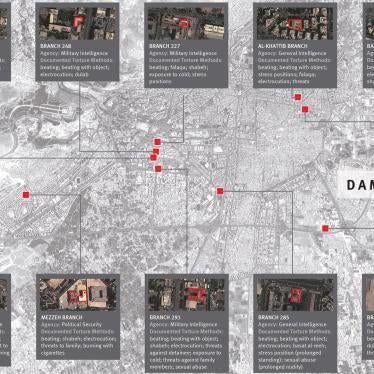Najib Mikati
Prime Minister
Lebanese Republic
Marwan Charbel
Minister of Interior
Lebanese Republic
Shakib Qortbawi
Minister of Justice
Lebanese Republic
Major General Abbas Ibrahim
Director-General of the General Directorate of the General Security
Lebanese Republic
Dear Sirs,
I am writing to inform you that we received a credible report on August 1 that General Security forcibly returned to Syria four Syrian nationals who expressed a fear of persecution in their country. Any forced return of persons at risk of persecution or other ill-treatment would constitute a contravention of Lebanon’s nonrefoulement obligations under international law.
On August 1, at approximately 4:45 p.m. Human Rights Watch staff spoke with Mr. Faisal Fares al-Faour on his cellphone. Mr. al-Faour informed us that he was at the Masnah border crossing and was about to be imminently deported to Syria along with 13 other men who had all been held in the General Security facility in Beirut. He told Human Rights Watch that he knew that at least three other individuals who were present with him at the time, Tarek Khalil al-Hamwi, Omar Talib Mohammed, and Issa Abdullah al-Hamid, had urged General Security not to deport them to Syria. Mr. al-Faour said that he was afraid to return to Syria and feared that he would be detained upon return.
Although Lebanon has not signed or ratified the 1951 Refugee Convention, customary international refugee law and international human rights law require it to respect the principle of nonrefoulement.
The principle of nonrefoulement establishes an absolute prohibition on the forced departure of a person to another state where there is a real risk of persecution or there are substantial grounds for believing that the person would be at real risk of a serious violation of human rights, including being subjected to torture. There can be no derogation from the principle of non-refoulement, including for people convicted of criminal offences in the host country. In addition, under the International Covenant for Civil and Political Rights and the Convention against Torture, Lebanon cannot send any person – including a convicted criminal – to a country where they would face a real risk of a serious violation of fundamental rights, including the right to life, or a real risk of torture or other serious ill-treatment.
Syrians at risk of detention upon return in Syria are at serious risk of torture and ill-treatment. Human Rights Watch has documented widespread torture and ill-treatment in Syrian detention facilities since anti-government protests began in March 2011.
In a statement on August 2, General Security indicated that the decision to deport the 14 Syrian nationals was due to “violations” and “crimes” committed by the latter in Lebanon and that General Security would not deport anyone who “might be endangered in their country upon deportation.” While we welcome the important recognition of the principle of nonrefoulement in the statement, the statement did not explain why General Security dismissed the fear that Mr. al-Faour expressed nor what process was put in place to examine the claims by Mr. al-Faour and at least three of the other 13 Syrians who were deported with him.
Further, while we welcome that Lebanon has decided to allow Syrians to renew their 6-months visa in Lebanon for a second time without leaving the country, we remain concerned about the thousands of Syrians who entered illegally or whose visas have already expired. We are also concerned about Palestinians living in Syria who have escaped to Lebanon and who only benefit from a 15-day visa renewable once.
Given the escalation of violence in Syria, the extent of human rights violations, and the numbers fleeing the country we urge Lebanon, as well as other host countries, to automatically recognize all civilians fleeing Syria as refugees and to guarantee they will not be returned there as long as the current situation persists.
Whether or not Lebanon agrees to do so, it is obligated to not forcibly return anyone who says they fear persecution unless the claim has been examined and rejected in a fair procedure. In the absence of refugee law and asylum procedures in Lebanon, such procedure should include unrestricted access to UNHCR, the UN agency in charge of determining refugee status, to any Syrian who expresses a fear of persecution if returned to Syria – even if the person is not registered with UNHCR at the time of detention.
With respect to the case of the 14 Syrians deported on August 1, at least four of whom appear to have been asylum seekers, Human Rights Watch calls on the Lebanese government to investigate this incident and publicly report on its findings.
Thank you for your attention to this matter.
Sincerely,
Sarah Leah Whitson
Executive Director
Middle East and North Africa Division
Human Rights Watch







